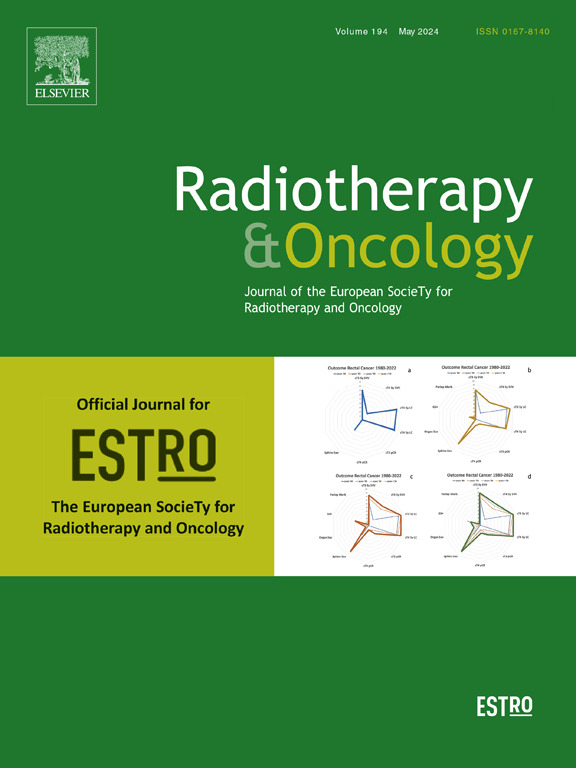EGCG protects intestines of mice and pelvic cancer patients against radiation injury via the gut microbiota/D-tagatose/AMPK axis
IF 5.3
1区 医学
Q1 ONCOLOGY
引用次数: 0
Abstract
Background and purpose
Radiation-induced intestinal injury (RIII) compromises the clinical utility of pelvic radiotherapy (RT). We aimed to explore the protective effect and underlying mechanism of (−)-epigallocatechin-3-gallate (EGCG) on RIII.
Materials and methods
We evaluated the protective effect of EGCG on intestine in RIII mouse model and pelvic cancer patients, while explored the underlying mechanism through (1) 16S rRNA sequencing, (2) metabolomic profiles, (3) fresh sterile fecal filtrate (SFF) transplantation, and (4) transcriptome sequencing.
Results
EGCG efficiently prevented RIII in mouse, as reflected by improved survival, alleviated intestinal structure damage, promoted intestinal regeneration, and ameliorated gut microbiota dysbiosis. Prophylactic EGCG intervention reduced the severity of RIII in patients receiving pelvic RT. Mechanistically, the protective effect of EGCG could be transferred to other mice by SFF transplantation. EGCG enriched gut microbiota-derived metabolite D-tagatose, and oral administration of D-tagatose reproduced the radio-protective effect of EGCG via activating AMPK.
Conclusion
Oral EGCG may be a promising strategy for preventing RIII clinically, and warrant further investigation in prospective randomized phase III trials.
EGCG通过肠道微生物群/D-tagatose/AMPK轴保护小鼠和盆腔癌患者的肠道免受辐射损伤。
背景和目的:放射诱导的肠道损伤(RIII)损害了盆腔放疗(RT)的临床应用。我们旨在探索(-)-表没食子儿茶素-3-棓酸盐(EGCG)对 RIII 的保护作用及其内在机制:我们评估了EGCG对RIII小鼠模型和盆腔癌患者肠道的保护作用,并通过(1) 16S rRNA测序、(2) 代谢组学图谱、(3) 新鲜无菌粪便滤液(SFF)移植和(4) 转录组测序探讨了其潜在机制:结果:EGCG能有效预防小鼠RIII,这体现在提高小鼠存活率、减轻肠道结构损伤、促进肠道再生以及改善肠道微生物群失调。预防性 EGCG 干预降低了盆腔 RT 患者 RIII 的严重程度。从机制上讲,EGCG的保护作用可以通过SFF移植转移到其他小鼠身上。EGCG富集了肠道微生物群衍生的代谢物D-塔格糖,口服D-塔格糖通过激活AMPK再现了EGCG的放射保护作用:口服EGCG可能是临床上预防RIII的一种有效策略,值得在前瞻性随机III期试验中进一步研究。
本文章由计算机程序翻译,如有差异,请以英文原文为准。
求助全文
约1分钟内获得全文
求助全文
来源期刊

Radiotherapy and Oncology
医学-核医学
CiteScore
10.30
自引率
10.50%
发文量
2445
审稿时长
45 days
期刊介绍:
Radiotherapy and Oncology publishes papers describing original research as well as review articles. It covers areas of interest relating to radiation oncology. This includes: clinical radiotherapy, combined modality treatment, translational studies, epidemiological outcomes, imaging, dosimetry, and radiation therapy planning, experimental work in radiobiology, chemobiology, hyperthermia and tumour biology, as well as data science in radiation oncology and physics aspects relevant to oncology.Papers on more general aspects of interest to the radiation oncologist including chemotherapy, surgery and immunology are also published.
 求助内容:
求助内容: 应助结果提醒方式:
应助结果提醒方式:


